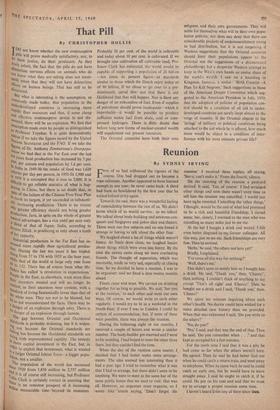That Pill
By CHRISTOPHER HOLLIS 00 not know whether the new contraceptive Pills will prove medically satisfactory, nor, to fuo them justice, do their producers. As they reel/1 admit, the fact that the pills do not have deleterious nervous effects on animals who do not know what they are taking does not neces- sarily mean that they will not have deleterious elreets on human beings. That has still to be uiseovered.
But what is interesting is the assumption, so c°11nnon1y made today, that population in the underdeveloped countries is increasing more ral'idlY than resources and that, if some cheap 4nd effective contraceptive device is , not dis- e°vered, there will be an explosion. We find that 4ssurnption made even by people as distinguished as Professor Toynbee. It is quite demonstrably Untrue if we take the figures issued by the United l'jations Secretariat and the FAO. If we take the utgures of Dr. Anthony Zimmerman's Overpopu- tati°n We find that in the Far East over the last en Years food production has increased by 3 per eel III Per annum and population by 1.4 per cent. ri India in 1949-50 the intake of food was 1,620 e,alories per day per person, in 1953-54 1,900 and 2.959 it is estimated that it rose to 2,000. It is rLineult to get reliable statistics of what is hap- fling in China, but there is no doubt that, in tsPite of the failure of the Chinese Five-Year Plan ° reach its targets, it yet succeeded in substanti- allY increasing production. There is no reason 'hY greater efficiency should not bring greater production. Java, in spite OR the whole of greater 11,4tural advantages, has a rice yield per acre only ; third of that of Japan. India, according to Aecr°'ne Ziliak, is producing at only about a tenth her capacity. Industrial production in the Far East has in- teased more rapidly than agricultural produc- During the last ten years it has tripled. t'sing from 57 to 156 with 1953 as the base year, 6lde that of the world at large only rose from to 132. There has of course been what Mr. p" eh ru has called 'a revolution in expectations.' tLe°Ple in the East, as elsewhere, want more than ueir ancestors wanted and will no longer be tent, as their ancestors were content, with a t'll'andard of living fantastically lower than that of e white man. They are not to be blamed, but :t us not misunderstand the facts. There may be danger of an explosion through envy. There is ° danger of an explosion through famine. The gap between Oriental and Occidental iganclards is probably widening, but it is widen- irla not because the Oriental standards are but because the Occidental standards are i.15108 with unprecedented rapidity. The remedy More capital investment in the East, but, in rrder to exploit that investment, what is wanted a larger Oriental labour force—a bigger popu- tion, not a smaller. 8. The population of the world has increased :nee 1920 from 1,810 million to 2,737 million cnd it is of course still increasing, but Professor thOlin Clark is certainly correct in asserting that were is no remotest prospect of it increasing 'thin measurable time beyond its resources. Probably 50 per cent. of the world is cultivable and today about 10 per cent. is cultivated. If we brought into cultivation all cultivable land, Pro- fessor Clark has estimated, the world would be capable of supporting a population of 28 bill:on —ten times its present figure—at standards similar to those which the Dutch enjoy today or of 90 billion, if we chose to go over to a pre- dominantly cereal diet—not that there is any likelihood that that will happen. Nor is there any danger of an exhaustion of fuel. Even if supplies of petroleum should prove inadequate—which is improbable—it would be possible to produce sufficient motor fuel from shale, coal or com- pressed hydrogen. There is little doubt that before long new forms of nuclear-created wealth will supplement our present resources.
The Oriental countries have both their own religions and their own governments. They will settle for themselves what will be their own popu- lation policies, nor does any deny that there are considerable pockets of undernourishment owing to bad distribution, but it is not surprising if Western suggestions that the Oriental countries should limit their populations appear to the Oriental not the suggestions of a disinterested philanthropy but a desperate Western attempt to keep in the West's own hands an undue share of the world's wealth. I saw on a hoarding in Kingston, Jamaica, a notice : 'Birth Control—A Plan To Kill Negroes.' Such suggestions as those of the American Draper Committee which sug- gested to the American President in July, 1959, that the adoption of policies of population con- trol should be a condition of all aid to under- developed countries are surely inept almost to the verge of insanity. If the Oriental objects to the 'strings' of military or political conditions being attached to the aid which he is offered, how much more would he object to a condition of inter- ference with his most intimate private life?


































 Previous page
Previous page